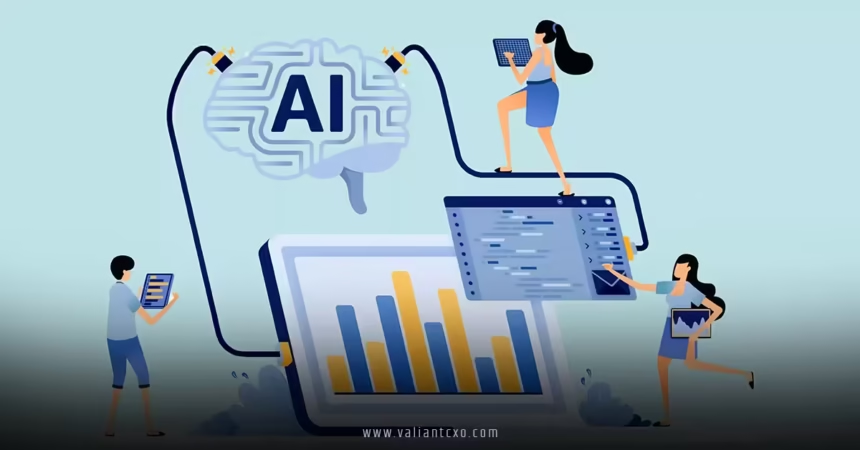AI for small businesses isn’t just a buzzword—it’s a game-changer. Imagine having a super-smart assistant who never sleeps, crunching numbers, personalizing customer experiences, and streamlining operations, all while you focus on what you love: running your business. That’s the power of artificial intelligence (AI). For small business owners, AI offers tools to compete with the big players without breaking the bank. But how exactly does it work, and why should you care? Let’s dive into the world of AI for small businesses and explore how it’s leveling the playing field.
What Is AI for Small Businesses?
At its core, AI for small businesses refers to the use of artificial intelligence technologies to enhance operations, improve customer interactions, and boost efficiency in small-scale enterprises. Think of AI as a Swiss Army knife for your business—versatile, powerful, and compact. From chatbots answering customer queries to predictive analytics forecasting sales, AI tools are designed to simplify complex tasks.
Small businesses often face resource constraints, whether it’s time, money, or manpower. AI steps in as a force multiplier, automating repetitive tasks and providing data-driven insights. Unlike large corporations with dedicated tech teams, small businesses can now access affordable, user-friendly AI solutions tailored to their needs. Sounds like magic, right? It’s not—it’s just smart technology working for you.
Why Small Businesses Need AI
Why should a mom-and-pop shop or a freelance gig care about AI? Simple: competition. In today’s fast-paced market, customers expect personalized experiences, lightning-fast responses, and seamless processes. AI for small businesses helps you deliver that without hiring an army of experts. It’s like having a co-founder who’s a data wizard, marketing guru, and customer service rep all rolled into one.
AI also saves time. Tasks that once took hours—like analyzing customer data or managing inventory—can now be done in minutes. Plus, AI tools are more accessible than ever, with cloud-based platforms requiring no coding skills. Whether you run a bakery, an e-commerce store, or a consulting firm, AI can make your life easier.
How AI for Small Businesses Drives Growth
AI for small businesses isn’t just about keeping up—it’s about getting ahead. Let’s break down the key ways AI fuels growth for small enterprises.
1. Enhancing Customer Experience with AI
Ever wondered how big brands seem to know exactly what customers want? AI is their secret sauce, and now it’s available to you. AI-powered chatbots, for instance, can handle customer inquiries 24/7, offering instant responses that make your customers feel valued. Tools like Intercom use AI to personalize conversations, turning casual visitors into loyal buyers.
AI also enables hyper-personalized marketing. By analyzing customer behavior, AI tools can recommend products or tailor email campaigns to individual preferences. Imagine sending a coffee shop customer a discount on their favorite latte just when they’re craving it. That’s the kind of magic AI for small businesses brings to the table.
2. Streamlining Operations and Boosting Efficiency
Running a small business often feels like juggling flaming torches while riding a unicycle. AI can take some of those torches off your hands. For example, inventory management tools like TradeGecko use AI to predict stock needs, preventing overstocking or shortages. It’s like having a crystal ball for your supply chain.
AI can also automate repetitive tasks like scheduling, invoicing, or payroll. Platforms like QuickBooks integrate AI to categorize expenses and generate financial reports in a snap. This frees you up to focus on strategy and growth, not paperwork.
3. Data-Driven Decision Making
Small business owners often rely on gut instinct, but AI for small businesses adds a layer of precision. AI tools analyze vast amounts of data to uncover trends and insights. For instance, a retail store might use AI to identify which products sell best during specific seasons, helping you stock smarter.
Predictive analytics, a subset of AI, can forecast sales, customer demand, or even market trends. Tools like Tableau make it easy to visualize data, turning numbers into actionable strategies. It’s like having a business advisor who’s always crunching the numbers for you.
Overcoming Challenges of Implementing AI for Small Businesses
Let’s be real: adopting AI for small businesses isn’t all sunshine and rainbows. There are hurdles, but they’re not insurmountable. Let’s tackle the big ones.
1. Cost Concerns
Many small business owners worry that AI is too expensive. While some advanced tools can be pricey, plenty of affordable options exist. Platforms like Mailchimp or HubSpot offer AI-driven features at budget-friendly prices. Plus, the time and money AI saves often outweigh the initial investment. Think of it as hiring a superstar employee who works for pennies.
2. Lack of Technical Expertise
You don’t need to be a tech genius to use AI for small businesses. Most modern AI tools are designed with beginners in mind, offering intuitive interfaces and step-by-step guides. Still nervous? Many platforms provide free trials or tutorials to ease you in. It’s like learning to ride a bike with training wheels—before you know it, you’re zooming along.
3. Data Privacy and Security
Using AI means handling customer data, which raises privacy concerns. The good news? Reputable AI providers prioritize security, complying with regulations like GDPR. Always choose trusted platforms and read their privacy policies. It’s like locking your shop’s front door—you wouldn’t leave it wide open, would you?
Top AI Tools for Small Businesses
Ready to dip your toes into AI for small businesses? Here’s a rundown of some user-friendly tools to get you started.
1. Chatbots for Customer Service
AI-powered chatbots like Tidio or Drift can handle customer queries round-the-clock. They learn from interactions, getting smarter over time. For a small business, this means happier customers without hiring extra staff.
2. Marketing Automation Platforms
Tools like Mailchimp or Constant Contact use AI to segment audiences and personalize campaigns. They analyze open rates, click-throughs, and more to optimize your marketing efforts. It’s like having a marketing team that never sleeps.
3. AI for E-Commerce
If you run an online store, platforms like Shopify integrate AI to recommend products, optimize pricing, or even predict trends. This helps you sell smarter, not harder.
4. Financial Management Tools
QuickBooks and Xero use AI to automate bookkeeping, track expenses, and generate reports. These tools make tax season less of a headache, letting you focus on growing your business.
Real-World Examples of AI for Small Businesses
Let’s paint a picture with some real-world scenarios. Imagine you own a small bakery. Using AI for small businesses, you could deploy a chatbot on your website to take orders or answer questions about gluten-free options. An AI tool could analyze sales data to predict how many cupcakes you’ll sell on weekends, ensuring you never run out. Or, you could use AI-driven email marketing to send personalized offers to loyal customers, boosting repeat visits.
Now, picture a freelance graphic designer. AI tools like Canva’s design assistant can suggest layouts or color schemes, speeding up your workflow. Meanwhile, an AI scheduler like Calendly books client meetings automatically, saving you from endless email threads. These are just a few ways AI for small businesses turns ideas into reality.
The Future of AI for Small Businesses
What’s next for AI in the small business world? The possibilities are endless. As AI technology evolves, we’ll see even more tailored solutions. Think voice-activated assistants managing your entire workflow or AI predicting market shifts before they happen. The future is bright, and small businesses stand to gain the most.
AI for small businesses is also becoming more accessible. With cloud-based platforms and subscription models, you don’t need a big budget to jump in. As more small businesses adopt AI, the competitive gap between small and large enterprises will shrink. It’s like giving every underdog a superpower.
How to Get Started with AI for Small Businesses
Ready to embrace AI for small businesses? Here’s a simple roadmap to get you going:
- Identify Your Needs: What pain points do you want to solve? Customer service? Marketing? Operations? Pinpointing your goals helps you choose the right tools.
- Research AI Tools: Look for platforms with good reviews, affordable pricing, and beginner-friendly interfaces. Check out free trials to test the waters.
- Start Small: Don’t overhaul your business overnight. Begin with one AI tool, like a chatbot or analytics platform, and scale up as you get comfortable.
- Train Your Team: If you have employees, ensure they understand how to use the AI tools. Most platforms offer tutorials or customer support.
- Monitor Results: Track how AI impacts your business—whether it’s increased sales, saved time, or happier customers. Adjust your strategy as needed.
Conclusion: Embrace AI for Small Businesses Today
AI for small businesses is more than a trend—it’s a revolution. By automating tasks, personalizing customer experiences, and providing data-driven insights, AI empowers small businesses to compete with the big leagues. Whether you’re streamlining operations, boosting marketing, or making smarter decisions, AI offers tools to help you grow without the growing pains. The best part? You don’t need to be a tech expert or have a massive budget to get started. So, why wait? Dive into AI for small businesses and watch your business soar to new heights.
FAQs About AI for Small Businesses
1. What is AI for small businesses, and why should I care?
AI for small businesses involves using artificial intelligence to automate tasks, enhance customer experiences, and drive growth. It matters because it saves time, reduces costs, and helps you compete with larger companies.
2. Is AI for small businesses expensive to implement?
Not necessarily! Many AI tools, like Mailchimp or Tidio, offer affordable plans or free tiers. The cost savings from automation often outweigh the investment.
3. Do I need technical skills to use AI for small businesses?
Nope! Most AI tools are designed for beginners, with user-friendly interfaces and tutorials. You can start using them without any coding knowledge.
4. How can AI improve customer service for small businesses?
AI for small businesses includes chatbots that handle customer inquiries 24/7, offering quick responses and personalized support, which boosts customer satisfaction.
5. Is my data safe when using AI tools?
Reputable AI providers prioritize data security and comply with regulations like GDPR. Always choose trusted platforms and review their privacy policies.
For More Updates !! : valiantcxo.com


